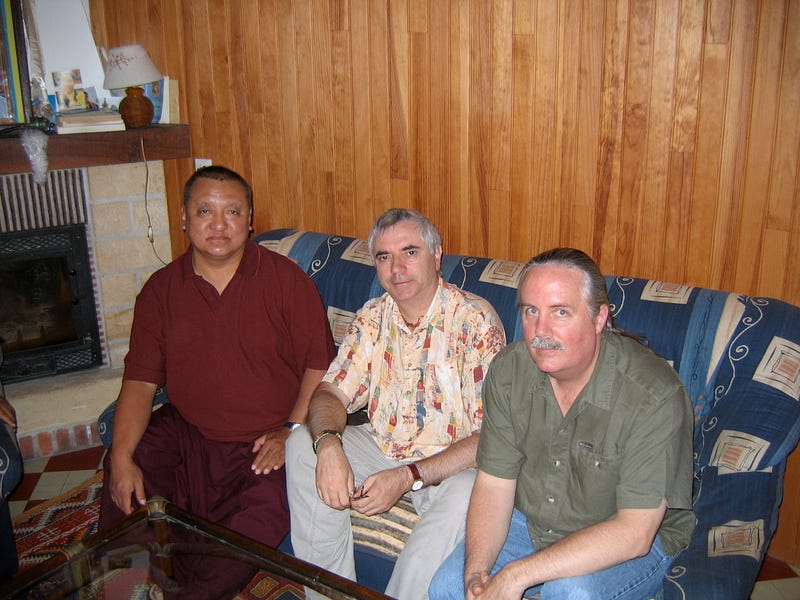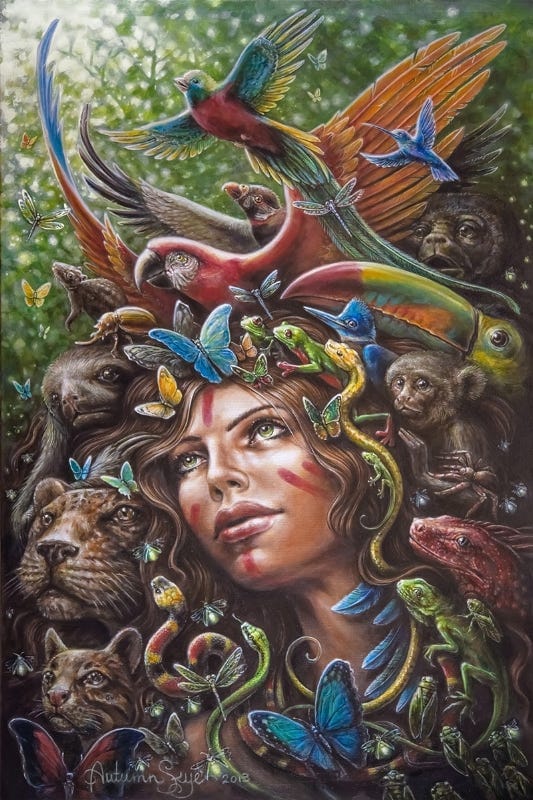In 2006, I was invited to dinner at my neighbor’s house. The guests, other than the neighbor and I, were the 14th Tibetan Shamarpa (Mipham Chögyi Lodrö), “Shamar Rinpoche,” as he was called, and his brother Jigme Rinpoche, who is the head of the large Tibetan Kagyu Buddhist center in my village here in France. Also, there was a Pakistani journalist and his wife, who were staying with my neighbor. The Pakistani woman was cooking a special dinner for us.
Two things I need to tell you: the first is that I wasn’t a Buddhist. I had moved to a place that is said to be the most blessed place on Earth by the Tibetans, because all of their most important and respected lamas of the last half century+ from all the Tibetan schools have taught here, such as the Dalaï Lama, who even I had heard about, and some have lived here full time, including His Holiness Kabjye Dudjom Rinpoche, who died here in 1987.
That’s amazing, given that there are only 452 residents here. But I didn’t know any of this when I bought a house here in 2002. Becoming curious about why there were so many Tibetan Buddhist centers in my community, because I was clueless as to why there were different types of it here amongst the 6 or 7 centers spread among the forests and hills above my village, I bought a thick book about the history and present organization of Tibetan Buddhism, and all its different schools. The book was very detailed and thorough in its 400+ pages, but what most captured my attention was one particular phrase which is central to this story.
The second thing was that I had been a vegan for most of my life, so when my neighbor invited me, I had to point out — as all ethical vegans and vegetarians still do — that I didn’t eat meat. He reassured me that our cook already knew that and was preparing two or three vegetable dishes, along with the three meat dishes she was preparing.
In Tibetan Buddhism there are what are called ‘lineages’ of teachers and their teachings, and each school is slightly different in their origin and interpretation of Buddhist philosophy, so even in each school, there are slightly different lineages. For example, the Dalaï Lamas are from a lineage in the Gelug school. The four schools are called the Nyingma, the Kagyu, the Sakya, and the Gelug. The Nyingma and Kagyu have the strongest presence here, and the Shamarpa is the head of one of the Kagyu lineages. So I was in very important company, totally in unfamiliar territory.

When we sat down for dinner, after some picture taking together, I found myself sitting just to the left of the Shamarpa. The plates of food were passed around the table in a clockwise direction, so the Shamarpa was passing to me. When he passed me a meat dish, I would just pass it along. When it was a vegetable dish, I would take some for my plate — perhaps even a little bit more than the others were taking. Finally, the Shamarpa asked me why I was not taking any of the meat. He and his brother had taken some of each plate offered, as is the Buddhist custom, so as not to insult the host and the chef. I learned this years later. It goes back to when the Buddha and his followers begged for their one daily meal. They ate what they were given. But that was thousands of years ago. Nowadays, their food comes from stores, and thus there is a choice that can be made. And in any case, the host and the chef knew that I was vegan, so there was no insult caused.
I had been feeling a bit confused because both the Shamarpa and his brother were taking the meat, and I thought that they wouldn’t be, based upon what I had read about Tibetan Buddhism. So I said the first thing that came naturally to my mind in response to his question, starting with an uncontrived, hesitant “uhhh…” followed by “compassion for all sentient beings…” His body startled with a jerk, and I felt that I had seriously insulted him, with my candid response. I wasn’t trying to be an ass, nor a militant vegan, I just didn’t understand why he and his brother would be eating the meat. That phrase was the one that had struck me so forcefully while reading that book on Tibetan Buddhism. To me, not eating meat — being compassionate to the animals whose flesh would be eaten — was the very essence of what Buddhism is.
He didn’t speak to me again for the rest of the evening. And I couldn’t get the sight of his upper body and head startling when I responded to him out of my mind. I felt that I had truly embarrassed myself in a most thoughtless way, so I kept to myself for the rest of the evening.
Years have gone by, and the Shamarpa passed away in 2014, but from time to time, I still think about that evening and feel embarrassed. My neighbor and I are still very friendly, and Jigme Rinpoche, the Shamarpa’s brother is still here, and every once in a while we cross paths, and he always greets me with a handshake and a smile. And I don’t know why, or rather, perhaps now I do.
I am still not a Buddhist, which is a term created by Westerners. Dzongsar Khyentse Rinpoche, another great teacher from the Nyingma school who has come here to teach, said that Tibetans don’t call themselves “Buddhist” because what we Westerners call “Buddhism” is just their way of life. I agree with that, and for me the most important aspect of that way of life, which I have made my own, is still to have “compassion for all sentient beings.”
The impetus for this story is a message I received from a friend in Germany. We often meditate at the same time each day, and send short messages to each other afterwards. Yesterday, Karma Pema sent me the message: “If you can be anything you want to, be kind. Karmapa chenno.” Receiving it made me once again think of that evening back in 2006, and for some reason I felt such a strong urge to share it with this friend, who I really don’t know at all. I didn’t know anything about this person, except what was listed on their profile.
I started to write back detailing this little story. My friend is a follower of the Karma Kagyu school of Tibetan Buddhism, the same one that the Shamarpa’s lineage is in, so perhaps that is why I thought to share the story. But looking back, why would I share such an embarrassing event? It became clear after I published this story.
But first,a very interesting thing happened when I looked up some details about the 14th Shamarpa.
I learned that just before his death, he founded the Infinite Compassion Foundation dedicated to reducing the suffering of animals used for food and to perform work. On the Foundation’s website there is a quote from him saying:
“Before we had compassion just for ourselves, but never really for others. This is the main root of all our problems; therefore, this attitude has to be changed. Instead of having compassion for yourself, you should have it for all sentient beings. You should have consideration for others.”
I suddenly saw our dinner together in a different light! The Shamarpa was a Tibetan man of great importance and steeped in a traditional way of life, that in some ways did not cohere exactly with the stated philosophy of that way of life because of certain exigencies of the context of place and time. The whole dinner was a juxtaposition of tradition and modernity: the Pakistani woman in her traditional dress, preparing her traditional plates of food for her husband and the other guests — in France — but not eating with the men. And I was an expatriate from New York living in France, mostly clueless about Buddhist philosophy, and its nuances, at the time, and it was my outsider’s innocent viewpoint that went to the heart of one of the most contentious issues found in all forms of Buddhism today: whether eating meat was consistent with the core backbone of Buddhism. To wit: doesn’t “compassion for all sentient beings” preclude their being used for food? No wonder he was so startled by my use of that often repeated phrase in answer to why I was not eating the meat dishes I was offered. And I did so simply because it so resonated with my ethical choice to not eat animal flesh.
But wouldn’t it be amazing if my social gaffe, for that is how I have remembered it being all these years, had planted a seed in the Shamarpa’s mind that came to fruition as his heartfelt intent to save the lives, and reduce the suffering of those who cannot speak for themselves? That before he died, he had focused his efforts to help others see that “Instead of having compassion for yourself, you should have it for all sentient beings” Even if my statement was just a microscopic nudge in that direction?
It is so amazing that the wing beat of a butterfly, like me, might have helped create the conditions that ripened into the Infinite Compassion of the Shamarpa, who, being in the position he was, was able to plant that seed in his students as well. And what a wonderful story to show how each and every one of us can help bring our world to a more universal compassion for ALL sentient beings — not just those beings like us — by intentionally trying to create the possibility that others will suddenly see that Universal Compassion is the only way to reduce the suffering of this world? That it should be a Way of Life, and not just some philosophy called Buddhism? We must speak our truth, as I did that day — speaking my truth to the powerful man sitting next to me.
It’s easy to attack the behavior of others, but it is fruitless to do so. Open discussion is a rare phenomenon nowadays, and it’s hard not to fall into telling someone what to do, rather than talking to them about what you feel is wrong. Yet, even today, such honest sharing of disparate views may take hold in unexpected ways. So be kind to each other, even though you may be worlds apart in philosophy, because we all share this one world.
So thank you, dear Karma Pema! Karmapa Chenno.
This was where this story originally ended when I first shared it with my neighbor, and of course, with Karma Pema. But then two things happened. The first is a happy clarification from my neighbor who told me what Shamar Rinpoche and Jigme Rinpoche actually thought of my statement all those years ago, that they had accepted it as my heartfelt truth, and that is why Jigme Rinpoche continues to shake my hand with a big smile when we cross paths.
The second speaks to a more important truth about this world — that we are not separate beings and reality is responsive, and creatively so. Karma Pema related to me that she was with the Shamarpa the day before he died, when he was already in the process of dying, but was giving some of his senior students teachings about dying and giving them advice about their own future deaths with lots of humor. She has a very strong connection to him still. And I believe that is the reason I so strongly felt the need to relate this story to her. That mantra, “Karmapa Chenno,” means “Embodiment of the compassion of all Buddhas, turn attention to me,” and that compassion is the responsive naturing of this world and all the living beings within it. May it be beneficial to all beings! And may we always see ourselves as all the other beings that we meet.



